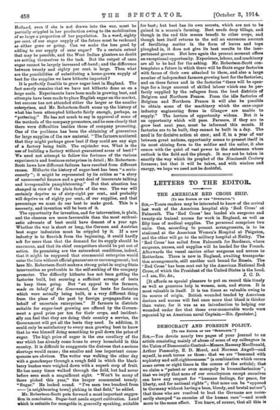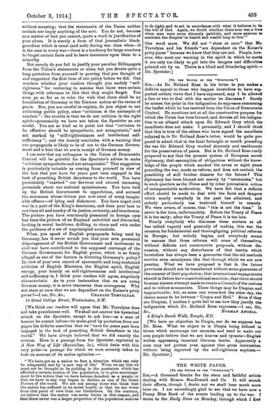DEMOCRACY AND FOREIGN POLICY.
[To THE EDITOR Cr TIM "Eirscriroz.']
Sin,—Yon devote nearly two pages of your journal to an article consisting mainly of abuse of some of my colleagues in the Union of Democratic Control—Messrs. Ramsay MacDonald, Arthur Ponsonby, E. D. Morel, and Norman Angell—and myself, in such terms as these : that we are " bemused with sophistry and self-righteousness" (a combination which recurs some seven or eight times in the course of the article); that we claim a "patent or even monopoly in humanitarianism"; that we imply that none of our countrymen except ourselves can have any respect for "humane feelings, for peace, for liberty, and for national rights "; that none can be "opposed to Germany without having a base, bloody, and brutal nature"; that those who are resolved to beat the Germans are neces- sarily stamped "as enemies of the human race"—and much more to the same effect. You know, of course, that all -this is without meaning; that the statements of the Union neither contain nor imply anything of the sort. You do not, because as a matter of fact you cannot, quote a word in justification of your abuse. It is merely a form of that journalistic black- guardism which is usual (and safe) during war time when—it is the case in every war—there is a tendency for large numbers to forget certain facts and to leave insistence upon them to a
minority.
Not merely do you fail to justify your peculiar Billingsgate from the Union's statements or aims, but you devote quite a long quotation from yourself to proving that you thought of and supported the first item of our policy before we did. One wonders whether your readers thought you unduly "self- righteous " for venturing to assume that there were certain things with reference to this that they might forget. You even go so far as to echo the wish that there shall be no humiliation of Germany or the German nation at the terms of peace. Nor, you are careful to explain, do you objeet to our criticizing public policy, since "criticism is the antiseptic of conduct ": the trouble is that we do not criticize in the right spirit—presumably we have not taken the Spectator as our
model. You are so kind as to point out that "criticism to be effective should be sympathetic, not antagonistic," and not marked by " aclf-rigliteousnees and intellectual self- sufficiency "; and the homily concludes with a warning that our propaganda is likely to be of use to the German Govern-
ment and a hint that we are in receipt of German money.
I am sure that my colleagues in the Union of Democratic Control will be grateful for the Spectator's advice to make " criticism sympathetic and not antagonistic." This suggestion is particularly valuable as coming from yourself in view of the fact that you have for years past been engaged in the task of preaching British decadence to the world. You have persistently " crabbed " our Services and uttered unceasing jeremiads about our national spinelessness. You have held up the British Government to opprobrium, and accused the statesmen whose virtues you now extol of every imagin- able offence—of lying and dishonour. You have urged civil war in a part of the King's dominions, and done your best to convince all and sundry of its justice, certainty, and imminence.
The picture you have continually presented to foreign eyes has been the picture of an England enfeebled and distracted, lacking in moral backbone, drifting to chaos and ruin under the guidance of a set of unprincipled scoundrels.
When you speak of English propaganda being used by Germany, has it never struck you that your own persistent disparagement of the British Government and incitement to civil war have contributed to the supposed contempt of the German Government for English power, which is so freely alleged as one of the factors in dictating Germany's policy P In view of your own record of systematic and long-sustained criticism of English Ministers, the English spirit, English energy, your homily on self-righteousness and intellectual self-sufficiency is, I think your readers will agree, singularly
characteristic. As to your insinuation that we are using German money, it is more venomous than courageous. Why
not state at once that we are dependent on the Kaiser's privy
[We think our readers will agree that Mr. Trevelyan does not take punishment well. We shall not answer his hysterical attack on the Spectator, except to ask him—as a man of
honour he cannot refuse—to make good by quotation from our
pages his definite assertion that we " have for years past been engaged in the task of preaching British decadence to the world." We have always believed that we did exactly the reverse. Here is a passage from the Spectator, reprinted in A New Way of Life (Macmillan, ls.), which deals with this very point—a passage for which we were severely taken to task on account of its undue optimism :— " We have got as a nation to face a situation which can only be adequately met by 'a new way of life.' When we say this we must not be thought to be yielding to the pessimism which has affected a certain section of the population, or to give encourage- ment to the notion that we have become decadent as a people, or that we have in any way begun to decline as one of the Great Powers of the world. We are not among those who think that the nation has suffered in its moral health, or that we are worse from that point of view than our forefathers. On the contrary, we believe that the nation was never better in this respect, and that there never was a larger proportion of the population anxious to do right, and to act in accordance with what it believes to be the will of God. Again, we doubt whether there ever was a time when men were more sincerely patriotic, and more anxious to maintain the Empire 'in health and wealth long to live."
One word more. We did not " state at once" that Mr.
Trevelyan and his friends "are dependent on the Kaiser's privy purse " because we know that they are not. People, how- ever, who meet our warning in the spirit in which he meets it are only too likely to get into the dangers and difficulties pointed out by us. Theirs is a blind and blundering spirit.—. ED. Spectator.]











































 Previous page
Previous page